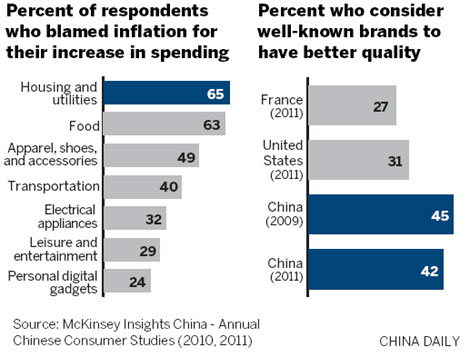Despite inflation, Chinese consumers remain confident
Updated: 2011-11-01 10:34
By Yu Ran (China Daily)
|
|||||||||||

SHANGHAI - Chinese consumers are more confident about their financial prospects than last year despite seeing rising inflation in China, according to the annual Chinese Consumer Study by McKinsey & Co released on Monday.
Fifty-eight percent of respondents said that they expected their incomes to rise next year, compared with 39 percent in 2010, and 50 percent said that they spent much more this year because of inflation.
"It's obvious that lots of Chinese people are still optimistic about their future, with a better quality of life stimulated by government domestic policies," said Yuval Atsmon, a partner of McKinsey & Co in Shanghai and co-author of the report.
Among the interviewees, 35 percent said they were trading up, buying more expensive goods in a given category, an increase from 26 percent in last year's survey, and 60 percent said that buying in quantity or more frequently was the main reason for their higher spending, compared with 54 percent in last year's survey.
"It's common for young people to buy the latest products, such as mobile phones, as our increasing income enables us to pursue the most diversified, highest quality of life that we can," said Zeng Liang, a white-collar worker from Shanghai.
The influence of brands on Chinese consumers' buying decisions is evident, though it doesn't strongly indicate increasing loyalty to any brand.
"The average Chinese consumer now chooses among three to five brands in any given category, compared with two to three brands two years ago - in some categories, for example, apparel, where luxury brands have grown hugely popular," Atsmon said.
The survey also showed why Chinese consumers value brands more than they are influenced by the price or purchasing medium, largely because they believe that branded products are more trustworthy, have a higher quality and are more reliable than non-branded ones.
"We tend to believe that branded products that cost more provide better quality standards compared with others," Zeng said.
In addition, the Internet has become an essential tool in consumers' daily lives, for by the end of 2010, China had the world's largest Internet user population, at 457 million.
"The potential development of the e-commerce market in China is promising, as more Chinese consumers have started buying products, especially clothes and accessories, via Internet," Atsmon said.
He added that companies must have both the flexibility to adapt and the skills to innovate to keep in step with the Chinese market's development and the tastes of Chinese consumers.
"To succeed in this environment, executives will need to understand where the growth prospects lie to modernize marketing tools for the Internet age, and to embrace rapidly growing online sales channels quickly," said Max Magni, partner and head of McKinsey's Consumer Practice in Greater China.
McKinsey's sixth annual survey of Chinese consumers' shopping behavior was conducted from February to April .
It interviewed 15,000 consumers in 49 cities, across four city tiers and six geographic regions, and surveyed general attitudes, leisure activities, and Internet usage. The survey delved deeply into five categories: apparel, automobile, consumer electronics, food and beverages, and home and personal care.










